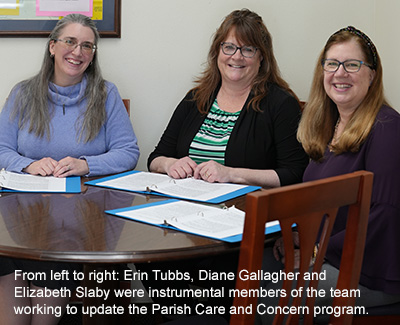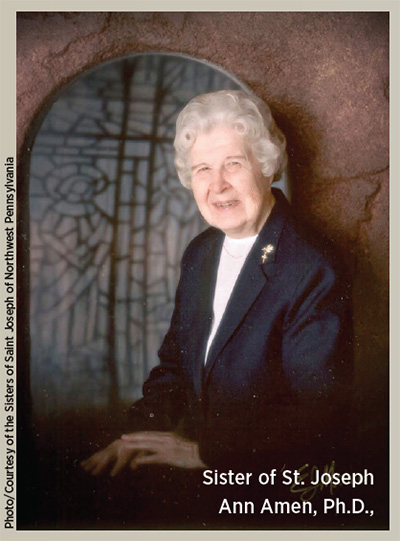
Reviving Parish Care and Concern
by Melanie Sisinni
08/06/2025
Parish Care and Concern, a diocesan ministry dating to the 1990s, is making a strong comeback.
This program aims to organize and streamline outreach efforts within the church community. As a model of service, members of a parish community volunteer for one year at a time to meet some of the basic human needs of the parish and local community.
Under the direction of volunteer coordinators, parishioners provide a variety of services to any person of need regardless of race, religion or ethnic affiliation. It provides parishes with a structured framework to support their members and their community while creating a more apparent connection between various outreach ministries. When Sister of St. Joseph Ann Amen, Ph.D., created the Parish Care and Concern program in 1996 for her master’s thesis, she considered it her most important ministry. Her blueprint for establishing the program and the volunteer training manual were used in more than 90 dioceses in 40 states in the United States, sold overseas and translated into Spanish.
When Sister of St. Joseph Ann Amen, Ph.D., created the Parish Care and Concern program in 1996 for her master’s thesis, she considered it her most important ministry. Her blueprint for establishing the program and the volunteer training manual were used in more than 90 dioceses in 40 states in the United States, sold overseas and translated into Spanish.
The ministry’s recent revival began with a renewed dedication to help those in need. Starting with a deep review of Sister Ann’s original work, the materials were updated to meet modern needs, including legal considerations such as liability and volunteer clearances.
“The manual was outdated for the modern world,” said Erin Tubbs, executive director for Catholic Charities of the Diocese of Erie. “There wasn’t enough emphasis on and support for following current and established policies and procedures to keep both volunteers and care recipients safe.”
While the core principles outlined by Sister Ann remain intact, the revised program now offers a more comprehensive guide that is easier to follow and more legally sound. One significant adjustment has been a strengthened clarity on pastoral involvement, ensuring that each parish pastor has a flexible role in leading or overseeing the program.
“We didn’t want the pastors or volunteers to feel overwhelmed because parish life has changed so much since the ‘90s,” Tubbs said. “Catholic Charities is working in tandem with the parishes to ensure that people across the diocese have access to the support they need. These services are in part funded by CSA dollars, allowing us to connect with individuals and communities across all 13 counties.”
One of the most significant benefits of Parish Care and Concern is its organizational structure. It consolidates the various outreach efforts within a parish – such as food pantries, transportation ministries and prayer shawl groups – into one cohesive system. This prevents the duplication of efforts and ensures that all parish members are on the same page when it comes to supporting one another.
The program introduces a “major coordinator” who oversees the entire parish’s Care and Concern initiatives, with section coordinators responsible for specific ministries. This system allows for clear communication among ministry leaders, volunteers and the pastor, ensuring that needs are met efficiently and that the parish’s efforts are well-coordinated.
Furthermore, the program empowers parishioners to participate in the work, making it easier for volunteers to contribute. Rather than committing to indefinite service, volunteers are encouraged to commit one year to a ministry, making it easier to get involved without feeling overwhelmed.
One of the unique aspects of this ministry is its adaptability. Every parish is different, and the needs of each community can vary. Parish Care and Concern is designed to accommodate these variations, allowing each parish to tailor its outreach efforts to what is most needed within its community.
Diane Gallagher, director of the Office of Social Service and Impact for Catholic Charities of the Diocese of Erie, explains how the program might differ in each parish.
“Someone might have a great group of retired handymen and women who use their gifts to help with minor home repairs. Another parish might not have people willing to do that, but they would be willing to provide babysitting to moms with young kids,” Gallagher said. “It’s really taking a look at the needs in your parish and what your parishioner volunteers are able and willing to do. Every parish will gear it toward those two things and make it unique; no two will look the same.” As the program gains traction, several parishes across the diocese are already expressing interest. For instance, Our Lady of Mercy Parish, Harborcreek, and St. Joseph Parish, Lucinda, are updating and renewing their existing Parish Care and Concern programs. At the same time, other parishes are excited about the potential of launching the program in their communities.
As the program gains traction, several parishes across the diocese are already expressing interest. For instance, Our Lady of Mercy Parish, Harborcreek, and St. Joseph Parish, Lucinda, are updating and renewing their existing Parish Care and Concern programs. At the same time, other parishes are excited about the potential of launching the program in their communities.
Parish Care and Concern is an opportunity for parishes to be the hands and feet of Christ in their communities. Creating a coordinated, responsive network of ministries allows parishioners to meet people where they are, offering tangible support where it’s needed most. Whether providing transportation to Mass, meals to new mothers or helping with home repairs, the ministry’s flexibility allows parishes to reach out in meaningful ways.
As more parishes embrace this renewed approach, the vision is clear: a church united in its efforts to care for parishioners and the broader community. With Catholic Charities’ support and parish staff leadership, the future of Parish Care and Concern looks bright.
The process for parishes interested in starting a Parish Care and Concern program is simple. Interested parties can contact Diane Gallagher at the Catholic Charities office to learn more and sign up for informational sessions, as well as learn more about upcoming events. Information sessions held in June in St. Marys, Hermitage and Erie provided a detailed overview of how to set up the program, offered training for coordinators and supplied the tools and resources needed for a successful launch. At the time of this printing, dates and locations are still being planned for more sessions. Please refer to the Catholic Charities website for the most updated information.
Once the program is established, Catholic Charities will continue to offer support, from providing training materials to answering any questions that arise.
-
